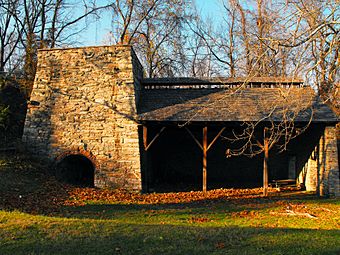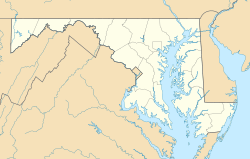Catoctin Furnace facts for kids
Quick facts for kids |
|
|
Catoctin Furnace Historic District
|
|
 |
|
| Location | Catoctin Furnace, Maryland |
|---|---|
| Built | 1774 |
| NRHP reference No. | 72000578 |
| Added to NRHP | February 11, 1972 |
Catoctin Furnace, also known as Catoctin Iron Furnace, is a historic place where iron was made a long time ago. It is located in Catoctin Furnace, Maryland, between Frederick and Thurmont. This site once had a large furnace that produced iron. Today, you can still see the remains of this important furnace.
History of Catoctin Furnace
Catoctin Furnace was built in 1774 by four brothers: Thomas, Baker, Roger, and James Johnson. They wanted to make pig iron from hematite, a type of iron ore found nearby. Pig iron is a basic form of iron. Hematite is a rock that contains iron.
By 1776, the furnace was working and making iron. It produced cannonballs for the American Revolutionary War. Some people say it also made cannons. It's also been suggested that iron from this furnace was used for the famous ship, the USS Monitor, much later. However, researchers now think this is unlikely. People who were enslaved worked at the furnace during this time. The Johnson brothers owned the furnaces together at first. After 1793, they owned them individually until 1811.
Eventually, three different furnaces were built at this site. Each one was named after the location.
- The first Catoctin Furnace was rebuilt in 1787, a short distance from its original spot.
- The second furnace was built in the 1850s by Jacob Kunkel. It was named Isabella. This furnace still stands today inside Cunningham Falls State Park.
The first two furnaces used charcoal as fuel. Charcoal is made by burning wood slowly. The third furnace opened in 1873. It used coke as fuel, which is made from coal. The entire iron-making complex closed down in 1903. This happened because costs were rising, and a railroad link was added too late to help.
Catoctin Furnace Today
The remains of the furnace are located within Cunningham Falls State Park. You can get a handout for a walking tour at the park's visitor center.
In 1973, a group called the Catoctin Furnace Historical Society, Inc. was formed. Its goal is to help restore and preserve the Catoctin Furnace Historic District. They want to keep it for educational and scientific purposes. The society studies and protects the rich history of this old industrial village. This includes its buildings, landscapes, and the daily lives of the workers.
Images for kids
 | Isaac Myers |
 | D. Hamilton Jackson |
 | A. Philip Randolph |





